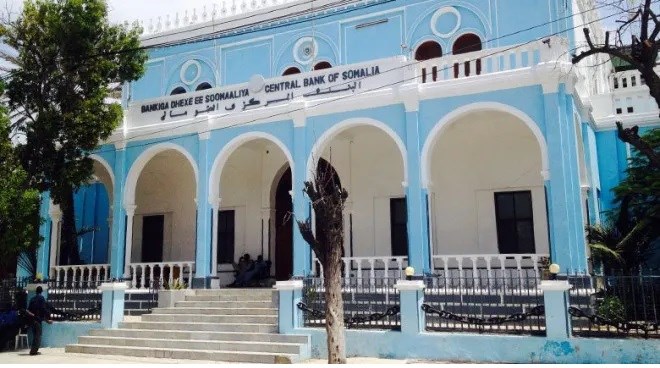
Friday November 1, 2024

FILE PHOTO - Central Bank of Somalia in Mogadishu
Mogadishu (HOL) — The pulse of progress is cautious in Somalia. The International Monetary Fund (IMF) and Somali authorities reached a staff-level agreement on the second review of the Extended Credit Facility (ECF).
The deal, sealed in Istanbul and Washington, D.C., is part of the 2024 Article IV consultation.
“Somalia’s real GDP growth outlook has improved, though challenges and risks remain significant,” IMF mission chief Laura Jaramillo said. The numbers speak to an upward trend—a 4% growth rate projected for 2024 and 2025, buoyed by agricultural resurgence and remittances. The outlook upgrade reflects economic resilience but comes with warnings from Jaramillo about significant risks, including climate-related shocks, regional security concerns, and an unpredictable global economy.
Somalia has maintained steady fiscal performance, meeting projections for 2024 with an overall deficit of 0.2% of GDP. The draft budget for 2025 targets domestic revenue at 3.3% of GDP while keeping the deficit level unchanged. However, hitting these targets hinges on international grants—an umbilical cord that Somalia cannot yet afford to sever. By 2027, officials hope to fund operational expenses purely through domestic revenue. Underpinning this ambition is the recently published Medium-term Revenue Roadmap, a blueprint that leans on customs modernization, a new income tax law, and sharper tax enforcement.
Progress in public financial management, notably in payroll integrity and debt management, has strengthened fiscal credibility.
The IMF credits the Central Bank of Somalia (CBS) with advancing financial sector reforms, focusing on institutional governance and financial deepening. Measures to align Somalia’s anti-money laundering and counter-terrorism financing standards with global benchmarks are ongoing.
A major development is the planned reintroduction of the Somali Shilling (SOS), supported by a currency board arrangement to enhance stability. After years without a national currency in wide circulation, this initiative, critical for facilitating small-scale transactions and expanding financial inclusion, will likely take up to 2 years to implement.
“The new SOS notes will provide an important liquidity function by facilitating payments for small value transactions and will promote financial inclusion for the most vulnerable,” Jaramillo said. Full implementation—a cautious 18 to 24 months away—depends on external financing and a currency board arrangement that must inspire confidence across Somalia’s fragmented regions.
Somalia’s government has prioritized inclusive growth and poverty reduction as key policy areas. Efforts to increase educational access and address gender gaps are expected to yield substantial economic benefits over the long term. Enhancing food security and building resilience to climate shocks are also at the forefront of the policy agenda.
Joining the East African Community presents both opportunities and challenges for Somalia. Authorities emphasize that the integration process must be carefully managed to balance the benefits and risks.
Despite progress, Somalia’s economic landscape remains fraught with challenges. Security concerns, both domestic and regional, and climate-related threats pose ongoing risks. The IMF stressed the need for continued international financial and technical support to help Somalia navigate these vulnerabilities and sustain reform momentum.